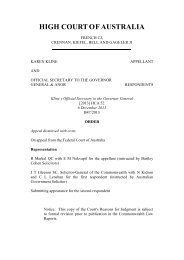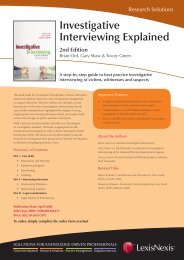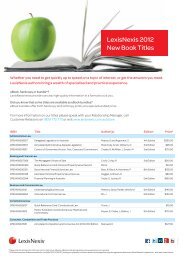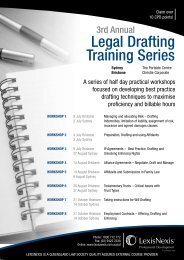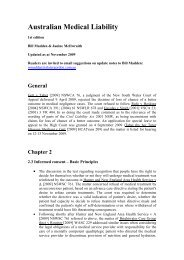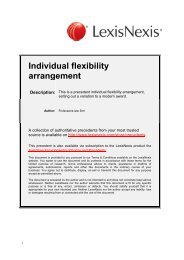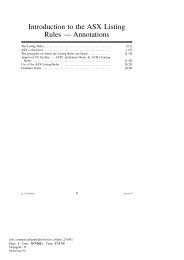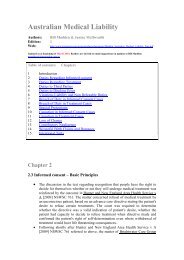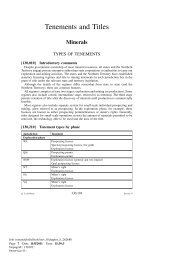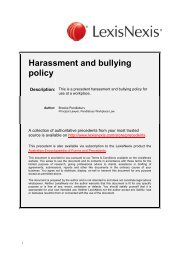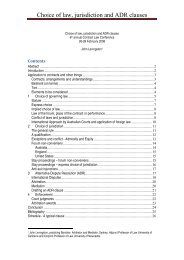Copyright LexisNexis. Sample only, not for classroom use or ...
Copyright LexisNexis. Sample only, not for classroom use or ...
Copyright LexisNexis. Sample only, not for classroom use or ...
You also want an ePaper? Increase the reach of your titles
YUMPU automatically turns print PDFs into web optimized ePapers that Google loves.
281<br />
CHAPTER 12: EQUITABLE ESTOPPEL<br />
12.52 In assessing the existence of detriment one must distinguish between expectation and<br />
reliance loss. It is clear that it is the reliance loss, and <strong>not</strong> expectation loss, that goes to establishing<br />
detriment. In Dela<strong>f<strong>or</strong></strong>ce v Simpson-Cook at 491, Handley AJA summarised the position as follows:<br />
The relevant detriment is <strong>not</strong> the loss flowing from non-fulfilment of the promise <strong>or</strong> assurance.<br />
The detriment that makes an estoppel en<strong>f<strong>or</strong></strong>ceable is that which the [relying party] would suffer,<br />
as a result of his <strong>or</strong> her <strong>or</strong>iginal change of position, if the assumption which induced it was<br />
repudiated by the [represent<strong>or</strong>].<br />
In the context of the facts of Waltons St<strong>or</strong>es v Maher, the expectation loss suffered by the Mahers was<br />
the loss of rent they expected Waltons to pay during the term of the anticipated lease. The reliance<br />
loss was the wasted expenditure incurred in demolishing and rebuilding the premises. It was the<br />
reliance loss, and <strong>not</strong> the expectation loss, that established detriment in that case.<br />
12.53 The significance of detriment is that it is this fact<strong>or</strong> which makes it unconscientious <strong>or</strong><br />
unjust <strong>f<strong>or</strong></strong> the represent<strong>or</strong> to depart from the promise <strong>or</strong> representation. In Waltons St<strong>or</strong>es v Maher,<br />
at CLR 404; ALR 524, Mason CJ and Wilson J said:<br />
[E]quity will come to the relief of a [relying party] who has acted to his detriment on the basis of<br />
a basic assumption in relation to which the other party has ‘played such a part in the adoption of<br />
the assumption that it would be unfair <strong>or</strong> unjust if he were left free to ign<strong>or</strong>e it’: per Dixon J in<br />
Grundt [at 675]… Equity comes to the relief of such a [relying party] on the footing that it would<br />
be unconscionable conduct on the part of the other party to ign<strong>or</strong>e the assumption.<br />
Failure to avoid detriment<br />
12.54 The represent<strong>or</strong> must have failed to act to avoid the relying party suffering detriment. One<br />
way in which action could be taken to avoid the detriment is by simply fulfilling the assumption <strong>or</strong><br />
expectation.<br />
12.55 However, it must be understood that the object of equitable estoppel is <strong>not</strong> to compel the<br />
represent<strong>or</strong> to fulfil the assumption <strong>or</strong> expectation, but rather to avoid detriment if the assumption<br />
<strong>or</strong> expectation goes unfulfilled. Thus, this might be done by the represent<strong>or</strong> advising the relying<br />
party that the assumption is mistaken be<strong>f<strong>or</strong></strong>e irreversible detriment has been incurred. In this<br />
respect, in Vella v Wah Lai Investment (Australia) Pty Ltd [2004] NSWSC 748 at [169], in a passage<br />
subsequently approved by the Vict<strong>or</strong>ian Court of Appeal in ACN 074 971 109 (as trustee <strong>f<strong>or</strong></strong> the<br />
Argot Unit Trust) v The National Mutual Life Association of Australasia Ltd (2008) 21 VR 351 at 391,<br />
Campbell J said:<br />
If one party, who has encouraged a<strong>not</strong>her to act on the basis that a particular state of affairs<br />
exists, gives <strong>not</strong>ice that that state of affairs should no longer be regarded as existing then, unless<br />
the other party has already irretrievably prejudiced himself by acting on the assumption that<br />
that state of affairs exists, the estoppel will cease to bind, either immediately <strong>or</strong> after the other<br />
party has been given reasonable <strong>not</strong>ice. This is the result of the principle that the relief which is<br />
appropriate to give effect to an estoppel is the minimum relief which would prevent the injustice<br />
arising by the person estopped departing from the assumption <strong>or</strong> expectation which has been<br />
induced.<br />
<strong>Copyright</strong> <strong>LexisNexis</strong>. <strong>Sample</strong> <strong>only</strong>, <strong>not</strong> <strong>f<strong>or</strong></strong> <strong>classroom</strong> <strong>use</strong> <strong>or</strong> distribution.<br />
Spi-Radan & Stewart - Principles of Australian Equity and Trusts 2nd ed. Ch.12.indd 281 10/10/2012 05:22:31<br />
200595



